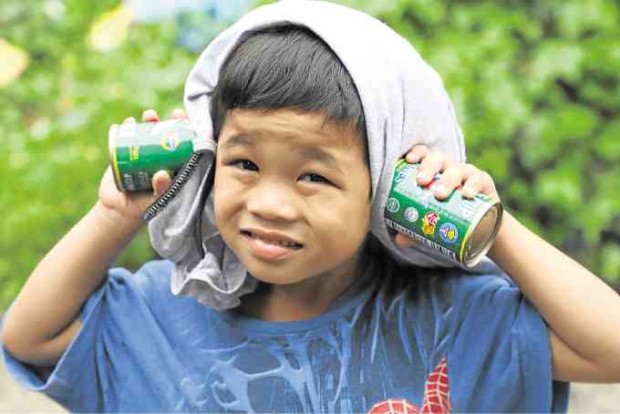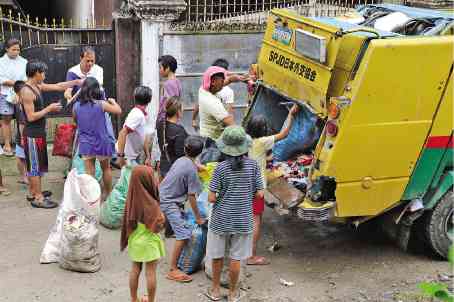Swapping garbage for sardines

NEXT MEAL A boy brings home two cans of sardines in exchange for trash collected in their neighborhood in Cebu City. —TONEE DESPOJO / CEBU DAILY NEWS
(Last of three parts)
CEBU CITY—Eight-year-old John Paul Liray ignored the drizzle. He kept putting trash he retrieved from a dirty creek into three plastic bags which he later carried, despite his frail frame, to a compactor truck parked at the interior sitio of Lower Laguerta in the city’s Barangay Lahug.
He was tired, dirty and wet from sweat and rain, but he didn’t mind. For the effort, he was given three cans of sardines from City Hall’s Department of Public Services (DPS).
“These will be our dinner later,” the boy said in Cebuano.
His mother works as a supermarket “promodiser” (promotional merchandiser), but her earnings are barely enough to feed her four children. His father is jobless; the boy smiled shyly when asked why.
“His father always drinks and goes out,” said James Sanico, 9, a classmate at Lahug Elementary School where the two completed Grade 3.
Hours earlier, Sanico and Liray had heard from neighbors that the DPS would be in their village for the city’s “Basura Mo, Sardinas Ko” campaign. They hurriedly looked for sacks and brought out trash from their homes, and even went to the nearby creek to recover more garbage.
Under the DPS program, a resident receives two cans of sardines for every sack of garbage collected and a third can for a smaller plastic bag, even if these are not
segregated.
According to Jerome Mañego, DPS staff in charge of the program, the city has purchased 3,508 boxes of sardines (100 cans per box) from a P4.4-million budget to implement the program for one year starting last month in two pilot areas—Lahug and Cogon Pardo.

Residents keep their communities clean as the Cebu City government tries different ways to solve the garbage problem. —TONEE DESPOJO / CEBU DAILY NEWS
Exchange deal
Mañego said that in one day, about 1,000 cans of sardines were distributed to residents in the two barangays in exchange for four to five tons of trash. One or two compactor trucks would go to Cogon Pardo in the morning, and to Lahug in the afternoon.
“So far, the response has been good. People would tell me that the sitios have become cleaner ever since we started the program. Before, they would just throw garbage anywhere. Now, they are competing against each other to gather more garbage in exchange for more cans of sardines,” the DPS official said.
Since the garbage trucks have difficulty entering the communities, the residents used to burn their trash or dump these into the river. The acts are prohibited under the Ecological Solid Waste Management Act of 2000 (Republic Act No. 9003) and violators are punished with a P300 to P1,000 fine or a jail term of one day to 15 days.
The new program provides incentives to the residents to clean their surroundings, said Stella Marie Sotto, 38, who received 10 cans of sardines for her trash.
Sotto said she had to compete with neighbors since the village’s small truck could not accommodate all their trash.
Brazilian experience
In Cogon Pardo, some even go to as far as the pond at nearby South Road Properties and transport their trash on an improvised raft to a roadside where the DPS trucks are waiting.
Mayor Tomas Osmeña patterned the “Basura Mo, Sardinas Ko” after a similar program in the City of Curitiba in Brazil, where garbage collection was a major problem. A 2013 article from Huffington Post quoted former Curitiba Mayor Jaime Lerner as saying that garbage trucks could not enter the narrow streets, steep hills and deep valleys, prompting residents to dump their trash in rivers and fields.
Under the Curitiba program, bus tokens are given to residents for segregated garbage delivered to the truck.
“In three to four months, the neighborhoods were all clean. It was a win-win solution,” Lerner was quoted as saying in the article.
Although Cebu City is a booming metropolis, only 20 percent of the land area is classified as urban and the rest are mountainous and hinterlands.
Gelasque said Cogon Pardo and Lahug were selected as pilot areas for “Basura Mo, Sardinas Ko” because these villages were near rivers and creeks and had no interior areas that were not accessible to garbage trucks.
With the program, the city hopes to lessen the volume of garbage that usually ends up in the rivers and creeks, and eventually into the sea.
Unless the situation is stopped, garbage will clog waterways, which can lead to floods during heavy rains.














